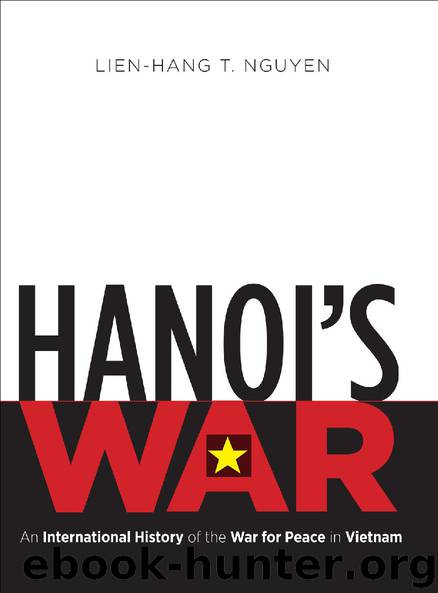Hanoi's War: An International History of the War for Peace in Vietnam (The New Cold War History) by Lien-Hang T. Nguyen

Author:Lien-Hang T. Nguyen [Nguyen, Lien-Hang T.]
Language: eng
Format: epub
Publisher: The University of North Carolina Press
Published: 2012-07-14T22:00:00+00:00
Vo Nguyen Giap (second from left) and Le Duan (in white shirt) with military cadres (Douglas Pike Photograph Collection, Vietnam Center and Archive, Texas Tech University)
At the same time that Hanoi leaders focused on the military sphere of the war, Nixon achieved a stunning victory in the diplomatic theater. Vietnam was the most important issue on Nixon’s agenda when he became the first American president to visit the People’s Republic of China from 21 to 28 February.39 Nixon toured the Great Wall and Shanghai and was feted by his Chinese hosts with great banquets, in a visit that was a historic event in not only the Vietnam War but the Cold War generally.40 During the second day of meetings, Zhou Enlai summarized the position Beijing had held on Vietnam since the start of Sino-American rapprochement: “Only the Indochinese [have] the right to speak, to negotiate with you [the United States]. But as the Indochinese area is a concern to us we should have the right to raise our voice on that matter. What’s more we have the obligation to give the Indochinese peoples assistance and support.”41 Turning to Nixon, Zhou Enlai asked if the president had any views differing from Kissinger’s regarding the Indochinese situation. Nixon reaffirmed that both the United States and China desired peace for Southeast Asia, while the Soviet Union only wanted to prolong America’s war. Nevertheless, Nixon insisted that the United States intended to end its role in the war through Vietnamization. To show that Washington would not just abandon its ally in Saigon, Nixon also issued a threat to the North Vietnamese via his Chinese hosts. If Hanoi persisted in escalating the war, the United States would have no choice but to close down diplomatic channels and respond militarily. Zhou carefully dealt with Nixon’s threat by encouraging the U.S. president to choose his friends more wisely in the future.42
After the United States and the PRC signed the Shanghai Communiqué, Zhou Enlai flew to Hanoi on 3 March to repair Sino-Vietnamese relations. During his talks with Le Duan and Le Duc Tho, the Chinese premier tried to reassure the North Vietnamese leaders that Beijing did not betray the Indochinese cause during Nixon’s visit. Instead, Zhou claimed that he told the United States that Vietnam was more important than Taiwan and that Nixon needed to negotiate based on the DRV’s nine points. The meeting was not all about damage control; Zhou Enlai also did Nixon’s bidding during his stay in Hanoi. The Chinese premier pressured VWP leaders to work toward a negotiated solution rather than seek a military victory, despite Beijing’s awareness of Hanoi’s plans for a large-scale military offensive. If the DRV did not negotiate on the basis of the U.S. seven points, Zhou warned, then Nixon would punish the North Vietnamese after his reelection.
VWP leaders were visibly upset at the meeting and did not attempt to restrain their anger. Le Duan told Zhou Enlai that the PRC had saved a “drowning” Nixon by inviting him to visit China.
Download
This site does not store any files on its server. We only index and link to content provided by other sites. Please contact the content providers to delete copyright contents if any and email us, we'll remove relevant links or contents immediately.
| Arms Control | Diplomacy |
| Security | Trades & Tariffs |
| Treaties | African |
| Asian | Australian & Oceanian |
| Canadian | Caribbean & Latin American |
| European | Middle Eastern |
| Russian & Former Soviet Union |
The Secret History by Donna Tartt(18213)
The Social Justice Warrior Handbook by Lisa De Pasquale(11957)
Thirteen Reasons Why by Jay Asher(8466)
This Is How You Lose Her by Junot Diaz(6457)
Weapons of Math Destruction by Cathy O'Neil(5845)
Zero to One by Peter Thiel(5503)
Beartown by Fredrik Backman(5369)
The Myth of the Strong Leader by Archie Brown(5244)
The Fire Next Time by James Baldwin(5025)
How Democracies Die by Steven Levitsky & Daniel Ziblatt(4967)
Promise Me, Dad by Joe Biden(4912)
Stone's Rules by Roger Stone(4867)
100 Deadly Skills by Clint Emerson(4697)
A Higher Loyalty: Truth, Lies, and Leadership by James Comey(4560)
Rise and Kill First by Ronen Bergman(4549)
Secrecy World by Jake Bernstein(4402)
The David Icke Guide to the Global Conspiracy (and how to end it) by David Icke(4387)
The Farm by Tom Rob Smith(4329)
The Doomsday Machine by Daniel Ellsberg(4250)
